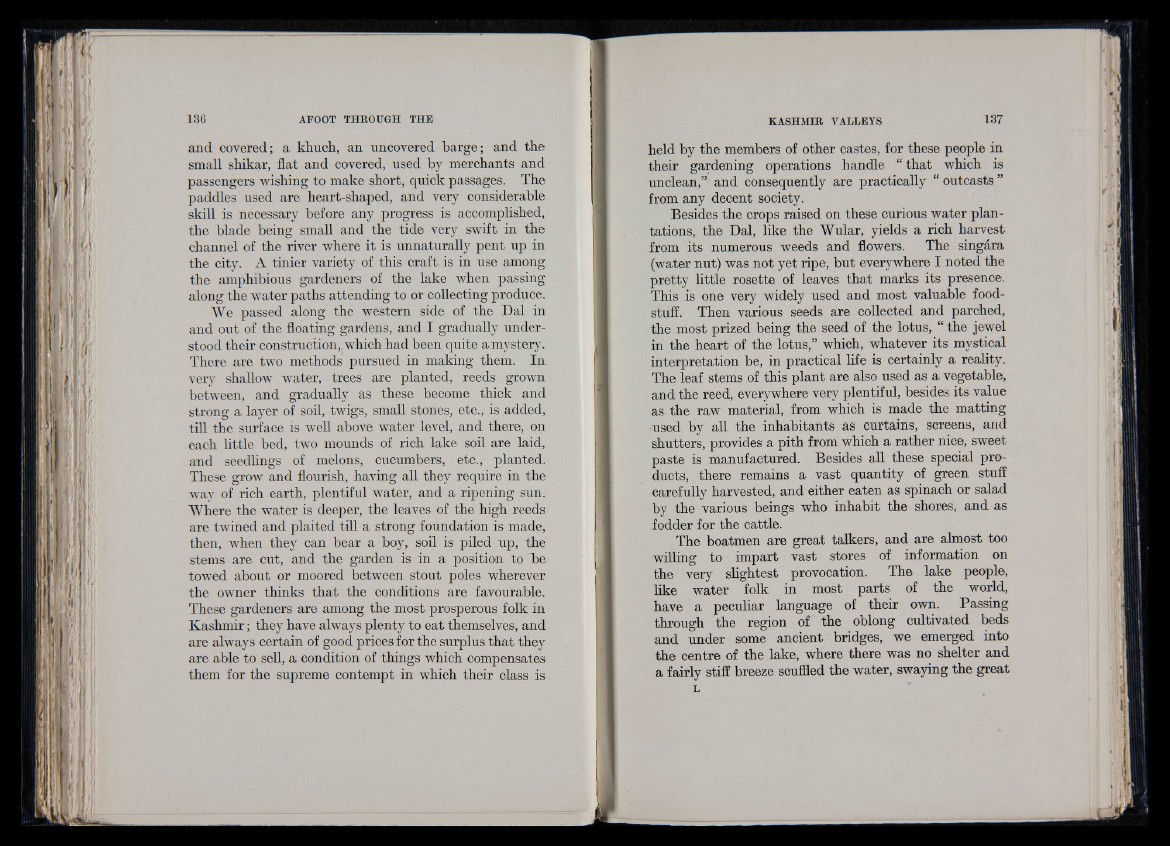
and covered; a khuch, an uncovered barge; and the
small shikar, flat and covered, used by merchants and
passengers wishing to make short, quick passages. The
paddles used are heart-shaped, and very considerable
skill is necessary before any progress is accomplished,
the blade being small and the tide very swift in the
channel of the river where it is unnaturally pent up in
the city. A tinier variety of this craft is in use among
the amphibious gardeners of the lake when passing
along the water paths attending to or collecting produce.
We passed along the western side of the Dal in
and out of the floating gardens, and I gradually understood
their construction^ which had been quite a mystery.
There are two methods pursued in making them. In
very shallow water, trees are planted, reeds grown
between, and gradually as these become thick and
strong a layer of soil, twigs, small stones, etc., is added,
till the surface is well above water level, and there, on
each little bed, two mounds of rich lake soil are laid,
and seedlings of melons, cucumbers, etc., planted.
These grow and flourish, having all they require in the
way of rich earth, plentiful water, and a ripening sun.
Where the water is deeper, the leaves of the high reeds
are twined and plaited till a strong foundation is made,
then, when they can bear a boy, soil is piled up, the
stems are cut, and the garden is in a position to be
towed about or moored between stout poles wherever
the owner thinks that the conditions are favourable.
These gardeners are among the most prosperous folk in
Kashmir; they have always plenty to eat themselves, and
are always certain of good prices for the surplus that they
are able to sell, a condition of things which compensates
them for the supreme contempt in which their class is
held by the members of other castes, for these people in
their gardening operations handle “ that which is
unclean,” and consequently are practically “ outcasts ”
from any decent society.
Besides the crops raised on these curious water plantations,
the Dal, like the Wular, yields a rich harvest
from its numerous weeds and flowers. The singara
(water nut) was not yet ripe, but everywhere I noted the
pretty little rosette of leaves that marks its presence.
This is one very widely used and most valuable foodstuff.
Then various seeds are collected and parched,
the most prized being the seed of the lotus, “ the jewel
in the heart of the lotus,” which, whatever its mystical
interpretation be, in practical life is certainly a reality.
The leaf stems of this plant are also used as a vegetable,
and the reed, everywhere very plentiful, besides its value
as the raw material, from which is made the matting
used by all the inhabitants as curtains, screens, and
shutters, provides a pith from which a rather nice, sweet
paste is manufactured. Besides all these special products,
there remains a vast quantity of green stuff
carefully harvested, and either eaten as spinach or salad
by the various beings who inhabit the shores, and as
fodder for the cattle.
The boatmen are great talkers, and are almost too
willing to impart vast stores of information on
the very slightest provocation. The lake people,
like water folk in most parts of the world,
have a peculiar language of their own. Passing
through the region of the oblong cultivated beds
and under some ancient bridges, we emerged into
the centre of the lake, where there was no shelter and
a fairly stiff breeze scuffled the water, swaying the great
L